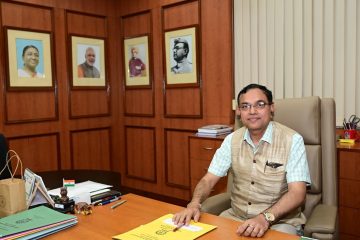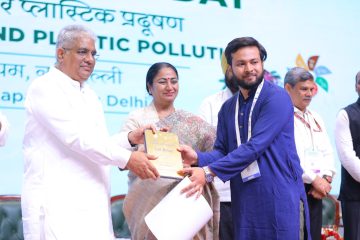Dr Anjali Gera Roy’s ongoing project, “After Partition: Post-memories of the Afterlife of Partition 1947”, is part of the worldwide initiative to record the stories of the victims of Partition as they orally recount their horror and heartbreak
A house by the river. Moonshine on the waters. And an amazing sunrise every day. That is how Sova Mukherjee recounts the idyll she had to leave behind in Noakhali when political vagaries and Partition drove them away from their land. The family got divided as they shifted to Ganderia in old Dhaka and then to Kolkata before coming together again. Sova ultimately found work in the Post and Telegraph Department and her brother in a bank. Her story might pale in comparison with other heartrending stories of Partition but it is important. Why? For one, she belongs to a generation of people who witnessed Partition first hand, a generation that is dying out. Together with them, we will lose the untold stories.
But there are several other reasons why the memories of people like Mukherjee need to be preserved, says Professor Anjali Gera Roy, Professor in IIT Kharagpur’s Department of Humanities and Social Sciences. Her current project sponsored by the Indian Council of Social Science Research is titled, “After Partition: Post-memories of the Afterlife of Partition 1947”.

Dr. Gera Roy sees her work as part of the worldwide initiative to record the stories of the victims of Partition as they orally recount their horror and heartbreak. This oral history serves as a bridge between official history, that is often a manipulated version of events to cater to the interests of the State and the powers that be, and remembered stories of the people who actually bore the brunt of the decisions taken by the administrators and politicians. Last year, a part of the collection of thousands of interviews of, “The 1947 Partition Archive”, a non-profit history organization in Berkeley, California, founded by Dr. Guneeta Singh Bhalla, was released online from Stanford University Library’s Digital Repository. Several others are trying to reconstruct the times through the memory and memorabilia of Partition survivors and witnesses, particularly of those who have been marginalized.
What is distinctive about Dr. Gera Roy’s project is its effort to bring within its ambit not merely the “embodied violence” of Partition, but also the “non-corporeal violence” by documenting the memories of Partition survivors and “postmemories” of “the hinge generation” (Hirsch 2008). This is the “1.5 generation” (Suleiman 2002), who suffered the indirect impact of Partition as children or young adults. The project focuses on the social and psychological traumas experienced by the survivors of displacement, their feeling of “unhomeliness” caused by their uprooting from settled existence, their sense of loss of privilege and status, the loss of language and culture through the pressure to assimilate, and their relegation to an outsider status despite achieving economic success.
The questions the project will be raising are several. What were the processes initiated by the State to resettle refugees after Partition? How did refugees negotiate with the State machinery to wrest rights and privileges? What were the networks they drew on to begin their lives anew? How did they negotiate with their new status in new regions and host communities? How did their assimilation into host cultures dispossess them of language, culture and a sense of belonging? How did they reconstruct old homes in new places?

The hundred or more accounts that have been recorded under the project so far already reveal interesting facets of Partition. One, the surprising spread of the new settlers throughout India. This goes against the notion that refugees from Punjab received preferential treatment from the post-colonial Indian state through their resettlement in East Punjab and areas surrounding the capital Delhi. The narratives of those who were forced to resettle in parts of Uttar Pradesh, Bihar, Madhya Pradesh, Bombay and even the deep South by drawing on state as well as private networks show that Partition-in-the-west was not one uniform experience shared by all those who crossed the border from the west but varied according to gender, class, language, and region, level of education and place of settlement.
The other important discovery is how dearly refugees still hold on to their distinct ethno-linguistic identities. Thus Radhakrishna Nagpal, who long settled in Ranchi, reiterates that he is of Bawhalpuri origin and signs his name in the Arabic script. Some others emphasize their Multani or Potohari identities or the fact that they are Sylheti.
The project brings together untold stories from areas which have generally been overlooked, say Sindh, Multan, Ladakh and Kashmir, or from small communities such as the Muslims in Chandernagore and the impact Partition had on them. Through each retelling, the project leaders believe, the story of victimhood gets transformed into a triumphalist saga of survival for the teller himself/herself. For a family from Montgomery who settled in Kashipur, Uttarakhand, and now owns hospitals and hotels, it is indeed a heroic tale. The matriarch of a family of jewellers, who cleared the dense forest vegetation in the terai region with her own hands, it is story of her own mehnat [hard labour], and that of her family. Sova Mukherjee, who remembers so longingly of her idyllic Noakhali, went on to become a Post Master.

The project has an international collaborator, Professor Nandi Bhatia, who is Associate Dean (Research) at the University of Western Ontario and has worked extensively on Partition. She would focus on the how Partition affected diasporic communities particularly in Canada. Together with Dr. Gera Roy, she organized an International Interdisciplinary Seminar on “India@70: Memories and Histories” at IIT Kharagpur in which eminent historians, sociologists, scholars in literary and film studies, filmmakers from India, Canada, the US and Singapore came together to deliberate the memories and histories of the events of 1947.
Apart from an academic audience, the project is also trying to reach a larger community through screening of films and public lectures. Ten oral history interns from universities across India shared their narratives in a Workshop led by Professor Amritjit Singh, Langston Hughes Professor of English and African-American Studies, Ohio University. They were supported by a poster exhibition curated by students of the Department of Architecture and Regional Planning, IIT Kharagpur. Professors Gera Roy and Bhatia plan to bring out an anthology of essays as one of the outcomes of the project. They also hope to prepare a digital archive on the lines of “The 1947 Partition Archive” that will be hosted by a Partition website. They are in conversation with the Partition Museum on the possibilities of collaboration.

Prof Gera Roy has been invited to present her findings in a panel on Partition in an International Conference on “Refugees in the Public Imagination” organized by University of Liberal Arts, Bangladesh in Dhaka on 22nd December 2017, in a special lecture – “After Partition: Memories and Postmemories of Partition 1947” – organised by the Indian Museum, Kolkata in association with INTACH on the eve of World Heritage Day on 17th April 2018 and in an invited paper in a Workshop, “Beyond Partition”, co-organized by Pippa Virdee (De Montfort University), Virinder Kalra (University of Warwick) and Emily Keightley (Loughborough University) at the Univeristy of Warwick on 18th May 2018. Prof Gera Roy is at present completing her manuscript of Memories and Post-memories of the Partition of India: After Partition 1947 for a reputed publisher that should be available early next year.




